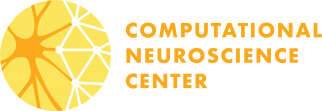FUTURE TENSE
Neuroscience, AI, and Society
A seminar series featuring scientists, thinkers, and writers on the intersections of neuroscience, artificial intelligence and society. This series is generously sponsored by Google DeepMind.
Sign up to receive announcements on upcoming Future Tense talks.
Upcoming Seminars
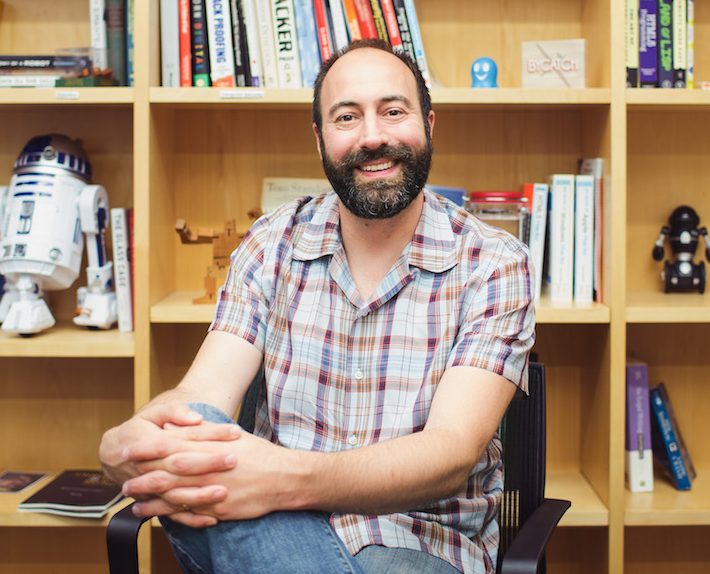
Law and Technology: A Methodical Approach
Ryan Calo
February 5 2026
7:00 pm, Magnuson Health Sciences Center K-069
Reception to follow in the Rotunda
Technology exerts a profound influence on contemporary society, shaping not just the tools we use but the environments in which we live. Law, uniquely among social forces, is positioned to guide and constrain the social fact of technology in the service of human flourishing. Yet, technology has proven disorienting to law: it presents itself as inevitable, makes a shell game of human responsibility, and daunts regulation. Drawing lessons from communities that critically assess emerging technologies, this book challenges the reflexive acceptance of innovation and critiques the widespread belief that technology is inevitable or ungovernable. It calls for a methodical, coherent approach to the legal analysis of technology—one capable of resisting technology’s disorienting qualities—thus equipping law to meet the demands of an increasingly technology-mediated world while helping to unify the field of law and technology itself.
Bio
Ryan Calo is the Lane Powell and D. Wayne Gittinger Professor at the University of Washington School of Law. He is a founding co-director (with Batya Friedman and Tadayoshi Kohno) of the interdisciplinary UW Tech Policy Lab and a co-founder (with Chris Coward, Emma Spiro, Kate Starbird, and Jevin West) of the UW Center for an Informed Public. Professor Calo holds a joint appointment at the Information School and an adjunct appointment at the Paul G. Allen School of Computer Science and Engineering.
Professor Calo’s research on law and emerging technology appears in leading law reviews (California Law Review, Columbia Law Review, Duke Law Journal, UCLA Law Review, and University of Chicago Law Review) and technical publications (MIT Press, Nature, Artificial Intelligence) and is frequently referenced by the national media. His work has been translated into at least four languages. Professor Calo has testified four times before the United States Senate, most recently providing witness testimony on July 11, 2024, before the United States Senate Committee on Commerce, Science and Transportation at a hearing titled “The Need to Protect Americans’ Privacy and the AI Accelerant.” Professor Calo stressed the importance of a comprehensive federal privacy law that both protects Americans’ personal privacy and sets guidelines for businesses developing and implementing AI technology.
sponsored by Google DeepMind
Past Seminars
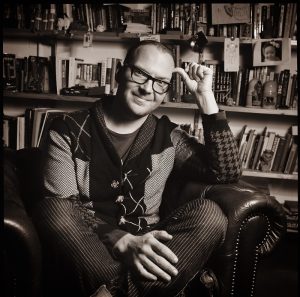
The Reverse-Centaur’s Guide to Criticizing AI
Cory Doctorow
December 4 2025
7:00 pm, Samuel E. Kelly Ethnic Cultural Center Theater (3930 Brooklyn Ave NE)
AI can’t do your job, but an AI salesman can convince your boss to fire you and replace you with an AI that fails to do your job. Being a smart AI critic requires that you distinguish between these two cases, because otherwise, you’re just gonna help that fast-talking sales person to put you on the breadline and screw over everyone who relies on your work.
Bio: Cory Doctorow (craphound.com) is a science fiction author, activist, and journalist. He is the author of dozens of books, most recently ENSHITTIFICATION: WHY EVERYTHING SUDDENLY GOT WORSE AND WHAT TO DO ABOUT IT (nonfiction); and the novels PICKS AND SHOVELS and THE BEZZLE (followups to RED TEAM BLUES). Other notable books include the solarpunk novels WALKAWAY and THE LOST CAUSE; the tech policy books THE INTERNET CON and CHOKEPOINT CAPITALISM; and the internationally bestselling YA LITTLE BROTHER series; and the picture book POESY THE MONSTER SLAYER. He maintains a daily blog at Pluralistic.net. He works for the Electronic Frontier Foundation, is an AD White Professor at Cornell University; an MIT Media Lab Research Affiliate; a Visiting Professor of Computer Science at Open University; a Visiting Professor of Practice at the University of North Carolina’s School of Library and Information Science. He co-founded the UK Open Rights Group. Born in Toronto, Canada, he now lives in Los Angeles. In 2020, he was inducted into the Canadian Science Fiction and Fantasy Hall of Fame. In 2022, he earned the Sir Arthur Clarke Imagination in Service to Society Awardee for lifetime achievement. In 2024, the Media Ecology Association awarded him the Neil Postman Award for Career Achievement in Public Intellectual Activity. York University (Canada) made him an Honourary Doctor of Laws; and the Open University (UK) made him an Honourary Doctor of Computer Science.
sponsored by Google DeepMind
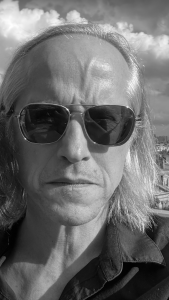
How to Survive Death: Moral personhood and the limits of the continuity-of-consciousness argument
Justin Smith-Ruiu
University of Paris
October 22 2025
7:00 pm, Foege Auditorium (3720 15th Ave NE)
Philosophers habitually speak of consciousness-uploading and self-uploading as if these were the same thing. In so doing they take for granted the correctness of a broadly Lockean account of personal identity, according to which I remain the same person from moment to moment, or perhaps someday from eon to eon, in virtue of the continuity of conscious memory. Woody Allen, too, was following in Locke’s footsteps when he joked: “I do not want to live on in the hearts of my countrymen, I want to live on in my apartment.” But is ongoing temporal duration from a distinct node of subjective experience really the only way to keep on being a person? Cross-cultural considerations show that many human groups make use of extremely low-tech devices for personhood-uploading —effigies, story-boards, tree-trunks—, and they hardly expect these objects, after the transfer of the deceased kin’s identity into them, to pass the Turing test or to display any observable signs of consciousness at all. “Yes, but they’re just imagining things,” you’ll say. Fair enough, but perhaps we are as well. If we are ever going to succeed at exploiting substrate-neutrality to evade or postpone mortality, it will be necessary not only to follow the right roadmap towards whole-brain emulation in effecting a high-fidelity transfer of consciousness from one substrate to another. It will also be necessary to examine our longstanding presumption, these days proliferated almost entirely without argument, that personhood and consciousness are identical. In this talk I will make a first stab at just such an examination, drawing in particular on the work of Bostrom, Chalmers, Parfit, and Charles Taylor, as well as on what I take to be salient examples of radically different conceptions of personhood from the ethnographic and historical record of human representations of reality and of our place in it.
sponsored by Google DeepMind
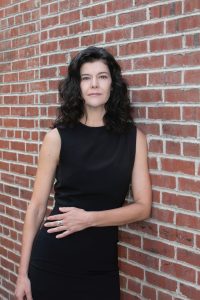
Elusive Cures: Why Neuroscience Hasn’t Solved the Mystery of Brain and Mental Illness
Nicole Rust, University of Pennsylvania
October 1 2024
K069, Health Sciences, 7:00 pm
Understanding the human brain is one of the great scientific challenges of our time. Progress in brain research has been accelerating rapidly for decades, following breakthroughs in biotechnology and artificial intelligence. But the translation of discoveries about the brain into treatments and cures for brain and mental disorders has not happened as many expected. What’s been missing?
In this event, Nicole Rust will take us on her personal journey to find answers. Drawing on her decades of experience on the front lines of neuroscience research, she will reflect on the history of our quest to understand the brain, how far we have come and what remains to be discovered. She will argue that treating a brain or mental disorder is more like redirecting a hurricane than fixing a domino chain of cause and effect, and that only by facing the brain’s complexity head-on will we have any hope of finding better treatments and cures. She will profile the pioneering ideas about the brain and mind that researchers are using to tackle this complexity, and the reasons we can be optimistic that the next few decades of brain research will be more impactful than the last.
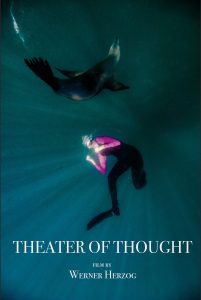
Theatre of Thought
May 14 2024
As part of the CoNectome 2024 meeting, we screened the Werner Herzog documentary Theatre of Thought, followed by a Q&A with Rajesh Rao, moderated by CoNECT.
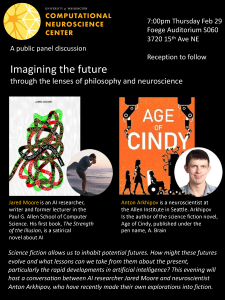
Imagining the Future
Jared Moore and Anton Arkiphov
February 29, 2024 7:00 pm, Foege S-060
Reception to follow in the Vista Cafe
Science fiction allows us to inhabit potential futures. How might these futures evolve and what lessons can we take from them about the present, particularly the rapid developments in artificial intelligence? This evening will host a conversation between AI researcher Jared Moore and neuroscientist Anton Arkhipov, who have recently made their own explorations into fiction

The Neuroscience of You: How Understanding Your Neural Lens Can Help You Connect with Others
Chantel Prat, UW Psychology
December 7 2022, 7:00 pm, HSB K069 (Health Sciences)
We are living through a social paradox in which an expanded appreciation for the importance of diversity co-exists with tense divisions between people who believe different things. How might knowing the ways each unique brain understands the world help us to connect with others who work differently? In this lecture, I’ll share some examples from my new book, The Neuroscience of You, which was written to help readers understand how their biology and experiences shape the lens through which they perceive things, including others.


Living with an aging mind:
Personal, philosophical and practical considerations
A conversation with Noga Arikha and Barak Gaster
October 14 2022, 7:00 pm, Foege Auditorium (Genome Sciences Building)
Dementia affects a significant fraction of the aging population. We host a conversation between physician Barak Gaster and philosopher of science Noga Arikha to discuss the experience of living with dementia and practical steps one can take to prepare for this contingency.

NeuroRights: Human Rights Guidelines for Neurotechnology
public lecture by Rafael Yuste
December 2, 2021 7:00 pm, Foege Auditorium (Genome Sciences Building)
Reception to follow in Vista Cafe
The development of Neurotechnology, defined as novel methods to both record and alter brain activity, is poised to have a transformative effect in science, medicine and society. At the same time, neurotechnology, particularly when combined with AI, could have severe ethical and societal consequences. In this talk Yuste will review the proposal made by the Morningside Group in 2017 to introduce new human rights into the Universal Declaration of Human Rights and provide ethical guidelines for neurotechnology development and its deployment. These “NeuroRights” protect mental privacy, personal identity and personal agency, and guarantee fair access to cognitive augmentation and protection from algorithmic biases. To help implement these rights, we propose to follow the medical model, introducing a “Technocratic Oath” as a deontology in the neurotech and data industry and using existing societal mechanisms similar to those already implemented in the medical industry to regulate future development of Neurotech and AI. Finally, I will discuss current advocacy efforts for NeuroRights in different countries, including Chile’s recent NeuroRights constitutional amendment and bill of law, Spain’s Charter of Digital Rights, as well as the United Nations.

Ethics in the age of AI
public lecture by Blaise Agüera y Arcas, VP and Research Fellow, Google Research
June 10, 2021 7:00 pm
We are in an era of heavy AI marketing alongside intense AI anxiety. What is AI, what is its true status now, and what are the implications of AI for the future? Recent dramatic advances in artificial neural networks have brought machines capable of superhuman visual recognition, game playing, and realistic dialogue. From here, we can make some informed guesses as to where the next few years might take us. This is a basis to think about a hybrid future of social relationships between intelligences of many kinds and scales— from tiny smart devices, to people, to corporations, state actors, entire economies and ecologies, and ultimately the planet as a whole.

In Silico with discussion with director Noah Hutton
May 5, 2021 7:00 pm
A young filmmaker sets out to document a brilliant neuroscientist who has become frustrated with his field’s status quo. With time elapsing and millions of dollars on the line, In Silico explores an audacious 10-year quest to simulate the entire human brain on supercomputers. Along the way, it reveals the profound beauty of tiny mistakes and bold predictions — a controversial space where scientific process meets ego, and where the lines between objectivity and ambition blur.

Ted Chiang
Author
“Reasoning about the Body”
October 20, 2020 7:00 pm

Peter Sterling
Professor of Neuroscience, University of Pennsylvania
“What is health?”
February 19, 2020

Christof Koch
President and Chief Scientist, Allen Institute for Brain Science
“Proust Among the Machines”
January 22, 2020 7:00pm

Lawrence Weschler
Author and Humanist
A talk on his recent book, “And How Are You, Dr. Sacks?” a biographical memoir on his friendship with Dr. Oliver Sacks
October 9, 2019

Patricia Churchland
Professor Emerita, University of California San Diego
“The Brains Behind Morality”
May 30, 2019

Genevieve Bell
Director of the Autonomy, Agency, and Assurance Institute at Australian National University
“Decolonising Artificial Intelligence: the arc of the new cybernetics”
April 15, 2019
